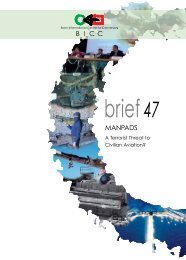egypt-final-presidential-elections-2012
egypt-final-presidential-elections-2012
egypt-final-presidential-elections-2012
You also want an ePaper? Increase the reach of your titles
YUMPU automatically turns print PDFs into web optimized ePapers that Google loves.
The Carter Center<br />
Conclusions and Recommendations<br />
The Carter Center recognizes that the <strong>2012</strong><br />
<strong>presidential</strong> election was just one part of<br />
Egypt’s ongoing political transition. It is in<br />
this light that the Center respectfully offers the following<br />
recommendations.<br />
To the Government of Egypt<br />
1. Ensure the protection of fundamental rights<br />
and freedoms.<br />
The Carter Center urges Egyptian lawmakers<br />
to seize the opportunities provided by Egypt’s<br />
continuing transition to ensure the full protection<br />
of fundamental rights and freedoms. The<br />
transition to date has not adequately ensured<br />
the protection and fulfillment of human rights.<br />
For example, Egypt’s longstanding and stifling<br />
Emergency Law remained in effect through the<br />
first round of the <strong>presidential</strong> election, although<br />
it has since been allowed to expire. The Carter<br />
Center urges all Egyptian leaders, lawmakers, and<br />
relevant authorities to work to ensure that any<br />
new electoral legislation uphold Egypt’s regional<br />
and international commitments to promote and<br />
protect fundamental human and political rights.<br />
This includes the new constitution of Egypt,<br />
which will form the basis of the electoral legal<br />
framework for future <strong>elections</strong>.<br />
2. Create a permanent, professional, and<br />
independent election management body.<br />
The Carter Center recommends that the future<br />
constitution explicitly provide for an independent<br />
electoral management body that is permanent,<br />
professional, impartial, accountable, and that<br />
acts with transparency, consistent with Egypt’s<br />
international commitments. This body should<br />
be mandated to issue and enforce regulations<br />
over all <strong>elections</strong> and referenda and maintain a<br />
continuous operational presence in all of Egypt’s<br />
27 governorates including a permanent headquarters<br />
in Cairo.<br />
In addition, the Center encourages lawmakers<br />
to reconsider whether sitting senior judges should<br />
serve as ex officio members of the EMB and<br />
likewise whether judges and judicial personnel<br />
should continue to act as the exclusive overseers<br />
of the electoral process at all levels of the electoral<br />
process, down to the polling-station level.<br />
While Egypt’s judiciary appears to enjoy broad<br />
trust among the electorate, having judges serve<br />
as polling station supervisors while also fulfilling<br />
their regular judicial duties places an unreasonable<br />
burden on individual judges and the judicial<br />
system. This also would address concerns of potential<br />
conflict of interest that exist for judges adjudicating<br />
election-related cases, given that <strong>elections</strong><br />
are exclusively administered at the national,<br />
governorate, and subcommittee level by fellow<br />
judges. In accordance with internationally recognized<br />
standards regarding judicial independence<br />
and ethics, the EMB and the judiciary should take<br />
transparent steps to ensure that those adjudicating<br />
election-related cases have no conflicts of interest,<br />
or the appearance of a conflict of interest, with<br />
judges supervising the electoral process who might<br />
be associated with the case at issue. The Carter<br />
Center suggests that decision-makers appoint<br />
qualified individuals, including those who are<br />
not active judges, to serve as electoral administrators<br />
and EMB leaders, in order to minimize<br />
the risks of judicial conflict of interest and to<br />
develop a professional cadre of full-time election<br />
administrators.<br />
3. Establish an appellate process for the review of<br />
EMB decisions.<br />
Under current Egyptian law, the Presidential<br />
Election Commission is the <strong>final</strong> authority on<br />
any election-related decision that it renders,<br />
67



